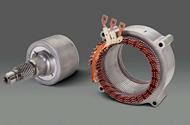Rotor (left) is spun by stator (right) to generate power
Magnet developed by Iron Magnetics claims to be twice as effective while being 75% more sustainable
One of the exciting things about technology is that the extent to which it will evolve can be unimaginable.
An iPhone is thousands of times more powerful than a 1980s supercomputer, for example.
The Clean Earth Magnet in development by US firm Niron Magnetics is another example, because powerful magnets are needed in just about every facet of human life, and this could be a game-changer in any device that uses an electric motor.
Electric motors, not just for cars but for everything from drills to submarines, come in various types, one of which is the permanent magnet motor. Therein the rotor has embedded magnets that are attracted to a rotating magnet field created by the stator – a set of electromagnetic coils surrounding the rotors.
The permanent magnets’ power has a bearing on the motor’s performance and efficiency. It also influences the motor’s size and weight, because the stronger the magnets, the smaller they can be – as can other parts of the motor on which they have an effect, like the rotor.
The most powerful types of permanent magnet make use of rare-earth metals such as praseodymium, terbium, neodymium and dysprosium. These materials aren’t actually all that rare, but extracting and processing them is labour-intensive, involves extensive mining operations and generates toxic waste.
There are alternatives for electric car manufacturers (like not using permanent magnets at all), but it’s probably fair to say that if a more environmentally acceptable alternative were available, it would be extremely desirable, especially since the demand for rare-earth magnets is growing at a substantial rate.
General Motors claims that it commercialised the world’s first high-powered rare-earth permanent magnet material 40 years ago, and now GM Ventures is investing in Niron, as is Stellantis, plus there’s previous investment from the Volvo Cars Tech Fund.
Niron makes the Clean Earth Magnet using iron and nitrogen (to produce iron nitride), both of which are commonly available, are sustainable and can be sourced globally.
By comparison, rare-earth materials aren’t, giving rise to concerns about security of supply.
China was the world’s largest supplier in 2022, at 70%; the US was the second-largest but at only 14%.
Niron says its new magnet is not only sustainable but also superior to one of the favourites, the neodynium magnet, giving 50% better overall performance. It also claims it has superior temperature stability, is cheaper, is less prone to price hikes and has 75% less environmental impact.
New electric motor designs will be able to use 15% to 30% less material, so parts can be smaller, reducing the overall size and weight of machines.
The technology is at the pilot stage and Niron says it can’t give specific timelines at the moment, so it’s likely to be a few years before we see EVs using the rare- earth-free magnets in the showrooms.







